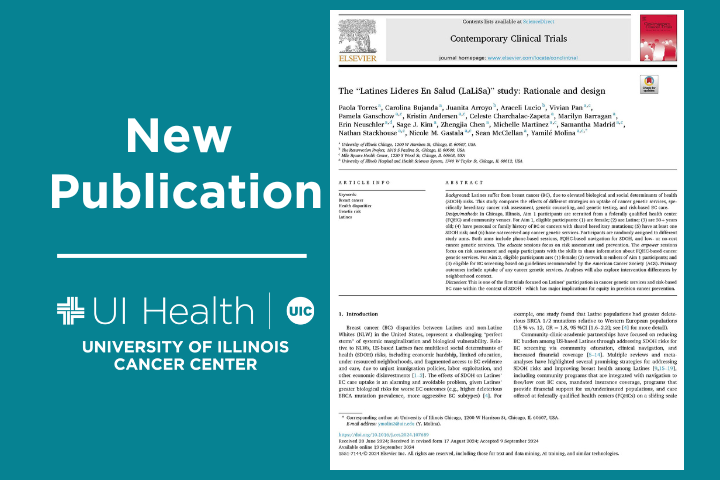
The “Latines Lideres En Salud (LaLiSa) Study: Rationale and Design,” which outlines an innovative approach to address health inequities by elevating Latine women as community leaders within their networks to promote cancer risk awareness and prevention, was published in the Elsevier journal Contemporary Clinical Trials.
The study is a collaborative work by authors from the University of Illinois Cancer Center, the breast cancer awareness and support group ELLAS (En La Lucha A Sobrevivir or In the Fight to Survive) at The Resurrection Project in Chicago, UI Health Mile Square Health Center (MSHC), University of Illinois Chicago (UIC) and UI Health, the UIC academic health enterprise.
Cancer Center Associate Director for Community Outreach and Engagement Yamilé Molina, PhD, is Principal Investigator on the study, which is supported by a Research Scholar Grant through the Illinois Cancer Health Equity Research (I-CHER) Center. The American Cancer Society awarded over $16 million in grants to establish Cancer Health Equity Research Centers at four Minority Serving Institutions (MSI), including UIC. Each institution received a four-year grant of $4 million, beginning January 2022. The I-CHER Center sits within the Cancer Center, which is part of UI Health.
LaLiSa is one of the first trials focused on Latines’ participation in cancer genetic services and risk-based breast cancer care within the context of social determinants of health (SDOH), which has major implications for equity in precision cancer prevention. Latines have elevated biological breast cancer risk and social risks due to structural factors. This study compares the effects of “Empower” and “Educate” strategies on the uptake of cancer genetic services, specifically hereditary cancer risk assessment, genetic counseling and genetic testing, and risk-based breast cancer care.
The study leveraged MSHC, one of the first Federally Qualified Health Centers (FQHCs) to offer low- and no-cost cancer genetic services and associated SDOH navigation as a part of standard care. Eligible MSHC patients were invited to participate in the study, in addition to community members. Molina is Associate Director for Community Engaged Research at MSHC.
The study indicates that results from the study “will support identifying which health promotion strategies may be most effective for the uptake and widespread promotion of affordable cancer genetic services by comparing the effectiveness of education/navigation and empowerment/navigation approaches in terms of genetic service uptake and diffusion of information through social networks.”
Molina is the study corresponding author and the other authors are Paola Torres, MPH; Carolina Bujanda; Vivian Pan, MS, CGC; Pamela Ganschow, MD; Kristin Andersen, MSN, RN; Sage Kim, PhD; Zhengjia (Nelson) Chen, PhD; Juanita Arroyo; Araceli Lucio; Celeste Charchalac-Zapeta; Marilyn Barragan; Erin Neuschler, MD; Michelle Martinez, RN; Samantha Madrid; Nathan Stackhouse, MD, MPH; Nicole M. Gastala, MD; and Sean McClellan, MD.
